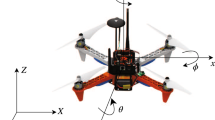Abstract
Very few studies have been carried out to test multi-robot task allocation swarm algorithms in real time systems, where each task must be executed before a deadline. This paper presents a comparative study of several swarm-like algorithms and auction based methods for this kind of scenarios. Moreover, a new paradigm called pseudo-probabilistic swarm-like, is proposed, which merges characteristics of deterministic and probabilistic classical swarm approaches. Despite that this new paradigm can not be classified as swarming, it is closely related with swarm methods. Pseudo-probabilistic swarm-like algorithms can reduce the interference between robots and are particularly suitable for real time environments. This work presents two pseudo-probabilistic swarm-like algorithms: distance pseudo-probabilistic and robot pseudo-probabilistic. The experimental results show that the pseudo-probabilistic swarm-like methods significantly improve the number of finished tasks before a deadline, compared to classical swarm algorithms. Furthermore, a very simple but effective learning algorithm has been implemented to fit the parameters of these new methods. To verify the results a foraging task has been used under different configurations.
Similar content being viewed by others
References
Agassounon, W., Martinoli, A.: Efficiency and robustness of threshold-based distributed allocation algorithms in multi-agent systems. In: 1st Int. Joint Conference on Autonomous Agents and Multi-agents Systems, pp. 1090–1097. Bologna, Italy (2002)
Altshuler, Y., Bruckstein, A., Wagner, I.: On swarm optimality in dynamic and symmetric environments. Second International Conference on Informatics in Control, Automation and Robotics (ICINCO) (2005)
Bonabeau, E., Sobkowski, A., Theraulaz, G., Deneubourg, J.L.: Adaptive task allocation inspired by a model of division of labor in social insects. In: Lundh, D., Olsson, B., Narayanan, A. (eds.) Bio Computation and Emergent Computing, pp. 36–45. World Scientific (1997)
Brian P. Gerkey, M.M.: A formal analysis and taxonomy of task allocation in multi-robot systems. Int. J. Rob. Res. 23(9), 939–954 (2004)
Campbell, A., Wu, A., Shumaker, R.: Multi-agent task allocation: learning when to say no. In: 10th Annual Conference on Genetic and Evolutionary Computation, pp. 201–208. Atlanta, USA (2008)
Choi, H.L., Brunet, L., How, J.: Consensus-based decentralized auctions for robust task allocation. IEEE Trans. on Robotics 25(4), 912–926 (2009). doi:10.1109/TRO.2009.2022423
Daichi Kato, K.S., Fukuda, T.: Risk management system based on uncertainty estimation by multi-robot. J. Robot. Mechatronics 20(4), 456–466 (2010)
de Oliveira, D., Ferreira, P.R., Bazzan, A.L.: A swarm based approach for task allocation in dynamic agents organizations. In: 3th International Joint Conference on Autonomous Agents and Multiagent Systems, vol. 3, pp. 1252–1253. Nueva York, USA (2004)
del Acebo, E., de-la Rosa, J.L.: Introducing bar systems: a class of swarm intelligence optimization algorithms. In: AISB Convention Communication, Interaction and Social Intelligence, pp. 18–23. Aberdeen, Scotland (2008)
Dias, M.B., Stentz, A.: Traderbots: a market-based approach for resource, role, and task allocation in multirobot coordination. Tech. Rep. CMU-RI-TR-03-19, Carnegie Mellon University, Pittsburgh, USA (2003)
Gerkey, B.P., Mataric, M.: Sold!: auction methods for multi-robot coordination. IEEE Trans. Robot. Autom. Special Issue on Multi-robot Systems 18(5), 758–768 (2002)
Ghiasvand, O.A., Sharbafi, M.A.: Using earliest deadline first algorithms for coalition formation in dynamic time-critical environment. Education and Information Tech. 1(2), 120–125 (2011)
Guerrero, J., Oliver, G.: A multi-robot auction method to allocate tasks with deadlines. In: 7th IFAC Symposium on Intelligent Autonomous Vehicles. Lecce, Italy (2010)
Guerrero, J., Oliver, G.: Multi-Robot Systems, Trends and Development, chap. Auction and Swarm Multi-Robot Task Allocation Algorithms in Real Time Scenarios, pp. 437–456. InTech (2011)
Jones, E.G., Dias, M., Stentz, A.: Learning-enhanced market-based task allocation for disaster response. Tech. Rep. CMU-RI-TR-06-48, Carnegie Mellon University, Pittsburgh, USA (2006)
Kalra, N., Martinoli, A.: A comparative study of market-based and threshold-based task allocation. In: 8th International Symposium on Distributed Autonomous Robotic Systems, pp. 91–102. Minneapolis, USA (2006)
Koes, M., Nourbakhsh, I., Sycara, K.: Heterogeneous multirobot coordination with spatial and temporal constraints. In: 20th National Conference on Artificial Intelligence (AAAI), pp. 1292–1297. Boston, USA (2005)
Lemaire, T., Alami, R., Lacroix, S.: A distributed tasks allocation scheme in multi-uav context. In: International Conference on Robotics and Automation (ICRA), vol. 4, pp. 3622–3627. New Orleans, USA (2004)
Liu, W., Winfield, A., Sa, J., Chen, J., Dou, L.: Strategies for energy optimisation in swarm of foraging robots. Lect. Notes Comput. Sci. 4433, 14–26 (2007)
Melvin, J., Keskinocak, P., Koenig, S., Tovey, C., Ozkaya, B.Y.: Multi-robot routing with rewards and disjoint time windows. In: International Conference on Intelligent Robots and Systems (IROS), pp. 2332–2337. San Diego, USA (2007)
Ramchurn, S.D., Polukarov, M., Farinelli, A., Truong, C.: Coalition formation with spatial and temporal constraints. In: International Joint Conference on Autonomous Agents and Multi-Agent Systems, pp. 1181–1188. Toronto, Canada (2010)
Rosenfeld, A., Kaminka, G.A., Kraus, S.: Coordination of Large Scale Multiagent Systems, chap. A Study of Scalability Properties in Robotic Teams, pp. 27–51. Springer-Verlag (2006)
Smith, S.L., Bullo, F.: The dynamic team forming problem: throughput and delay for unbiased policies. Syst. Control. Lett. 58, 709–715 (2009)
Werger, B.B., Mataric, M.J.: Broadcast of local eligibility for multi-target observation. In: 5th International Symposium on Distributed Autonomous Robotic Systems, pp. 347–356. Knoxville, USA (2000)
Yang, Y., Zhou, C., Tin, Y.: Swarm robots task allocation based on response threshold model. In: 4th International Conference on Autonomous Robots and Agents, pp. 171–176. Willengton, New Zealand (2009)
Yu, L., Cai, Z.: Robot exploration mission planning based on heterogeneous interactive cultural hybrid algorithm. In: 5th International Conference on Natural Computation, pp. 583–587. Tianjin, China (2009)
Author information
Authors and Affiliations
Corresponding author
Additional information
This work has been partially supported by project DPI2008-06548-C03-02 and FEDER funding.
Rights and permissions
About this article
Cite this article
Guerrero, J., Oliver, G. Swarm-like Methodologies for Executing Tasks with Deadlines. J Intell Robot Syst 68, 3–19 (2012). https://doi.org/10.1007/s10846-012-9666-9
Received:
Accepted:
Published:
Issue Date:
DOI: https://doi.org/10.1007/s10846-012-9666-9




